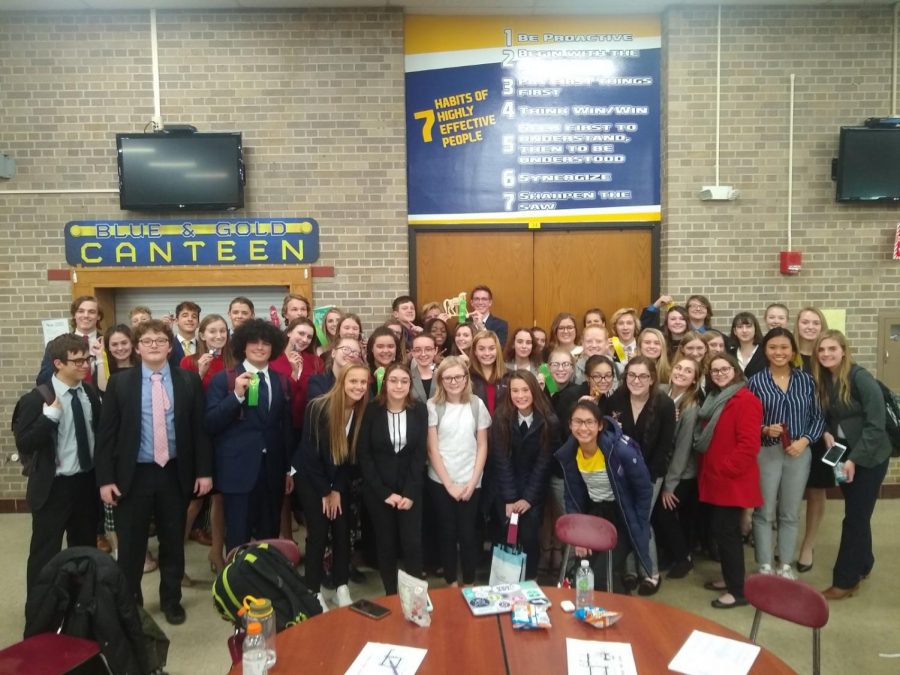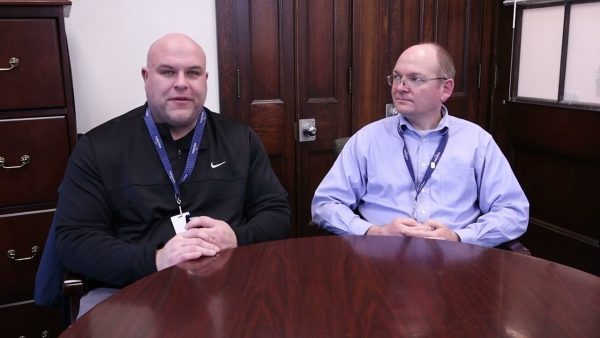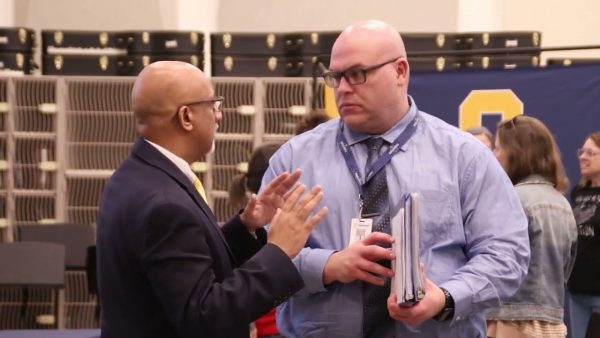Speak openly, debate proudly
Coaches and students give their perspectives on Speech and Debate, start season off strong
The Speech and Debate team is in the midst of the season, claiming first place at two tournaments, Findlay and Princeton, and fourth at Mentor.
“Speech and Debate is a very big time commitment,” Matt Deters, coach, said. “In a peak season, which we’re just getting into now, I’d probably put in an extra thirty to forty hours of work a week.”
Gavin Enseleit (12) is the Debate captain this year and has been doing Speech and Debate since his freshman year in the category Public Forum.
“My favorite part about Debate is, in the actual Debate rounds, probably asking the questions and doing the cross examination, but outside of the actual round it’s probably the friendships you have with people from other schools,” Enseleit said.
Enseleit (12) and Clara Leach (11) earned first, earning a bid to state, with Tess Patton (10) and Julia Neal (10) following close behind in second, also earning a bid, and Sebastian Roederer (9) and Lily Meehan (11) in sixth place.
Ashton Tucker (12) has also been doing Speech and Debate since freshman year and participates in Congressional Debate.
“My favorite part about Congress is that I get to compete with similar people at each tournament and discuss different political events with them,” Tucker said. “I wouldn’t ever discuss certain political topics if it weren’t for Speech and Debate.”
Congress may present many challenges due to its complicated nature.
“We have so many different topics and arguments we need to memorize for one tournament and that’s really stressful,” Tucker said. “You’re debating from one and a half to two and a half hours depending on the tournament. But once you get on stage all that stress goes away and the time passes by really quickly.”
At the tournament in Findlay, Tucker and Jack Benbow (10) each placed fourth in their chambers, and Zihua Qian (12) came in fifth place.
Bryn Cortez (11) has been doing Speech and Debate since her sophomore year and is in the speech category Informative Speaking.
“When I first went in for my interview I was really unsure of what I wanted to do,” Cortez said. “I did not really know if I wanted to do Speech and Debate, but I am really happy with the category they put me in. It’s probably the least competitive category, so I can kind of just have fun with it.”
Cortez came in tenth place at the Princeton tournament.
Natalie Bridgewaters (10), who has been doing Speech and Debate since her freshman year, has recently switched to the category Dramatic Speaking.
“Drama is where you put in characters different voices different emotions into a speech you have written,” Bridgewaters said. “I love this event because I get to be creative and put my own take on the speech.”
Bridgewaters’ favorite part about dramatics is a technique called “popping”.
“Popping is when you have different characters in your piece and you,” Bridgewaters said. “I have three others aside from my main person. You have to make your ‘pops’ very distinct and make sure that the characters have different voices and different stances than your regular person.”
Bridgewaters cannot wait to continue her career in the Speech and Debate community.
“The best part is the community because they’re all so supportive,” Bridgewaters said. “Everyone is willing to encourage you to get better and it really motivates you to get better.”
Bridgewaters came in sixth place at the Princeton tournament while Isabel Rubin-Alvarez (10) came in fourth place.
Enseleit says that Speech and Debate has helped him learn different things that he can use outside the group.
“The big thing Speech and Debate teaches us is research and presentation skills, but I think a much more important thing it teaches you is how to have grace and self control,” Enseleit said. “For an hour you and your opponents are arguing with each other and trying to explain to the judge why the other person is wrong. After the round you have to not take the arguments personally and be friendly with the people you were arguing with.”
Tucker has enjoyed doing Speech and Debate throughout her high school career, and has learned skills that she can apply to the real world.
“Speech and Debate has helped me grow in ways I never thought were even possible,” Tucker said. “My public speaking skills have grown so much since my eighth grade year when I first tried out, and it really helped improve my confidence. One of the most important parts, however, is that I have acquired so many leadership skills which I have used throughout my life outside of Speech and Debate.”
Other notable achievements include the following: At the Princeton tournament, Alex Mayer (12) finished in 1st and earned a bid to state in International Extemporaneous. In Program Oral Interpretation, Sophie Soller (12) earned first, earning a bid to State, and Shayla Frederick (10) finished in second. In Lincoln Douglas Debate, Canaan Smith (11) finished second and earned a bid to State. In Humorous Interpretation, Sam Stack (11) placed third. In Congressional Debate, Ashton Tucker came in fourth place. In US Extemporaneous, Ella Conard (11) came in fifth. In Informative Speaking, Gabby Hutchinson (11) finished in sixth. Marley Wiemers (11) earned seventh and Lauren Hamiel (11) took ninth in Original Oratory in a field of over thirty competitors. Zihua Qian (12) earned eighth and Porsche Ashley (12) earned eleventh in Congressional Debate. Cat Tian-Svobodny (10) took eighth place in Lincoln Douglas in a field of over forty competitors.
For the Findlay tournament in Dramatic Interpretation, Isabel Rubin-Alvarez (10) earned first place, earning a bid to state, Allie Wilson (12) came in second, Emerson Davis (9) came in fifth, and Natalie Bridgewaters (10) came in sixth. Humorous Interpretation, Sam Stack (11) earned first, earning a bid to state, Matthew Wilson (10) came in fourth, and RJ Plunkett (10) came in sixth. United States Extemporaneous, Lucas Butler (11) finished in second earning a bid to state, and James Jarvis (11) placed sixth. In Duo Interpretation, Izzy Caruso (11) and Alexx Anderson (11) won second place, Halle O’Hara (10) and Maggie Bremner (10) came in third, and Zimin Qian (10) and Emily Ballard (10) came in fifth place.
At the Mentor tournament, Canaan Smith (11) earned second in Lincoln Douglas Debate and earned a bid to state. In Program Oral Interpretation, Lane Bokros (11) came in third and Sophie Soller (12) earned fifth, both getting a bid to state. Hannah Hutchinson placed fourth place and earned a bid in Original Oratory. In Humorous Interpretation, Sam Stack came in fourth place and earned a bid. Audrey Wiemers (11) earned sixth in Declamation and earned her first bid to state. In Duo Interpretation, Maggie Bremner & Halle O’Hara came in sixth place. In Lincoln Douglas Debate, Canaan Smith (11) came in third, with Sydney Hardern (12) in sixth. Program Oral Interpretation, Sophie Soller (12) came in fourth, and Shayla Fredrick (10) came in fifth. Congressional Debate, Ashton Tucker (12) and Jack Benbow (10) each placed fourth in their respective chambers, and Zihua Qian came in fifth place. In Declamation, Audrey Wiemers came in sixth place. In Informative, Bryn Cortez seventh place and Gabby Hutchinson eighth. In Original Oratory: Marley Wiemers eighth place. In Public Forum: Tess Patton and Julia Neal fifteenth place out of fifty-one teams.
The team heads out on December seventh for the Upper Arlington/Moeller Split.







